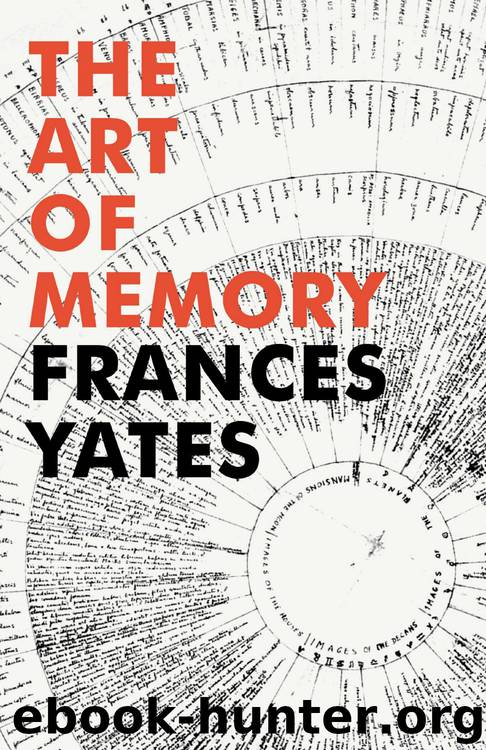The Art of Memory by Frances A Yates

Author:Frances A Yates
Language: eng
Format: epub
ISBN: 9781448104130
Publisher: Random House
Published: 2017-01-15T05:00:00+00:00
CHAPTER 10
RAMISM AS AN ART OF MEMORY
DURING THE PERIOD in which occult memory was thus gathering momentum and becoming increasingly daring in its aims, the movement against the artificial memory – and I speak of it now as the rational mnemotechnic as a part of classical rhetoric – had also been growing much stronger. As mentioned in an earlier chapter, the influence of Quintilian on the humanists was not favourable to the art, and we have heard Erasmus echoing Quintilian’s lukewarm attitude to places and images and his emphasis on order in memory.
As the sixteenth century advanced, much thought was given by humanist educators to rhetoric and its parts. For the traditional five parts as defined by Cicero different arrangements were suggested in which memory dropped out.1 In these trends the influence of Quintilian was again important, for Quintilian mentions that some rhetoricians of his time were not including memory as a part of rhetoric. Amongst the new style sixteenth-century educators who were omitting memory from the parts of rhetoric was Melanchthon. Naturally, the omission of memory from rhetoric means that the artificial memory is discarded, and repetition or learning by heart becomes the only art of memory advised.
Of all the reformers of educational methods in the sixteenth century the most prominent, or the most self-advertised, was Pierre de la Ramée, more generally known as Peter Ramus. Ramus and Ramism have been extensively studied in recent years.2 In what follows I shall abbreviate as much as possible the complexities of Ramism, referring the reader for further information to the works of others, my aim being solely to place Ramism within the context of the argument of this book, where it may come out in a somewhat new light.
The French dialectician whose simplification of teaching methods made such a stir was born in 1515 and died in 1572, massacred as a Huguenot in the Massacre of St Bartholomew. This end recommended him to Protestants, to whom his pedagogical reforms were also welcome as a means of sweeping out the complexities of scholasticism. Amongst the complexities of which Ramus made a clean sweep were those of the old art of memory. Ramus abolished memory as a part of rhetoric, and with it he abolished the artificial memory. This was not because Ramus was not interested in memorizing. On the contrary, one of the chief aims of the Ramist movement for the reform and simplification of education was to provide a new and better way of memorizing all subjects. This was to be done by a new method whereby every subject was to be arranged in ‘dialectical order’. This order was set out in schematic form in which the ‘general’ or inclusive aspects of the subject came first, descending thence through a series of dichotomized classifications to the ‘specials’ or individual aspects. Once a subject was set out in its dialectical order it was memorized in this order from the schematic presentation – the famous Ramist epitome.
As Ong has said, the real reason
Download
This site does not store any files on its server. We only index and link to content provided by other sites. Please contact the content providers to delete copyright contents if any and email us, we'll remove relevant links or contents immediately.
The Art of Thinking Clearly by Rolf Dobelli(10412)
Mindhunter: Inside the FBI's Elite Serial Crime Unit by John E. Douglas & Mark Olshaker(9313)
Change Your Questions, Change Your Life by Marilee Adams(7733)
Nudge - Improving Decisions about Health, Wealth, and Happiness by Thaler Sunstein(7689)
Mastermind: How to Think Like Sherlock Holmes by Maria Konnikova(7313)
The Power of Now: A Guide to Spiritual Enlightenment by Eckhart Tolle(5744)
Men In Love by Nancy Friday(5231)
Altered Sensations by David Pantalony(5091)
Factfulness: Ten Reasons We're Wrong About the World – and Why Things Are Better Than You Think by Hans Rosling(4729)
The Confidence Code by Katty Kay(4247)
Thinking in Bets by Annie Duke(4216)
Man and His Symbols by Carl Gustav Jung(4120)
The Worm at the Core by Sheldon Solomon(3483)
Why Buddhism is True by Robert Wright(3446)
Liar's Poker by Michael Lewis(3440)
Three Women by Lisa Taddeo(3419)
The Inner Life of Animals by Peter Wohlleben(3302)
Descartes' Error by Antonio Damasio(3270)
How Music Works by David Byrne(3256)
